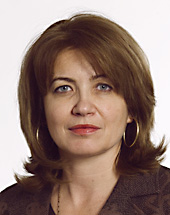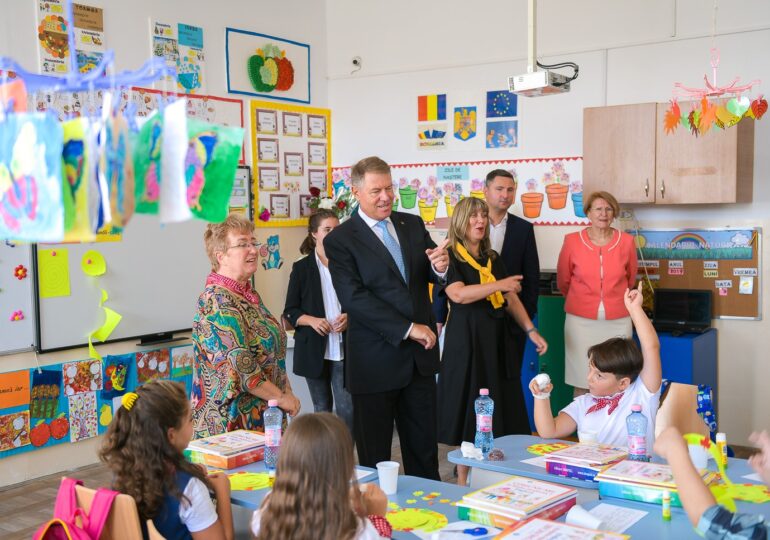We are opening the festive school year, we are the country of the podium, and we distribute textbooks to students from 2004. We are raising a generation of sick children who never manage to have lunch in a year. We kill their creativity and curiosity, we „dope” them with formulas for admission to the 5th grade. We want to create a high-quality education system without teachers.
These are the alarm signals raised in an interview given to SpotMedia.ro by Mrs. Mihaela Popa, a mathematics teacher at Vasile Alecsandri High School in Iași, with 34 years of experience in teaching and top results from her students.
One-fifth of the students who started the preparatory class nine years ago did not show up for the National Evaluation. 15-16 thousand students were lost just in the 8th grade. 38% received grades below 5. How many more students will be lost this year? And the new law has not changed anything, says Prof. Mihaela Popa.
Solutions exist, but they are not in the new law: a general education system between the ages of 6 and 16, followed by high school only for those with grades above 5; depoliticization; more decision-making power for schools.

How do you see this beginning of the school year, what are the main issues?
The first response comes from the pass rate, grades above 5, at the National Evaluation (NE), and from the fact that 20% of the students who started the preparatory class nine years ago did not show up for the NE.
30,000 fewer students, of which 15-16 thousand were lost just in the 8th grade. The Ministry did not explain where and how they disappeared, even though they were asked.
To these 20% of students who were lost between the preparatory class and the 8th grade, we add the 38% who received grades below 5. And if we add those with exactly a grade of 5, who are on the brink, we reach a score of 60%.
There are lost students who do not know basic Romanian language and mathematics. How many more students will be lost this year?
We have a somewhat digitized system, we can see the absences. Have these children ever come to school, has there been societal involvement, because we are not only talking about the educational system?
We have a new law...
The new law has not changed anything. I have always said that we need a general education system, between the ages of 6 and 16, where we do not subject the child to any exams.
Yes, continuous assessments, but of the system, not of the child. And when I discover that a child in the 2nd grade does not know any letters, cannot write, should I fire the teacher or the educator who did not do their duty, or should I move forward and fine the parents who did not send their child to school?
A child who comes to school every day cannot not know how to write, read, and count in the 8th grade.
Every year we count the 10 grades. I see no difference between a student with a grade of 9.90-9.95 and 10 in mathematics. The questions were designed in such a way that a very good student, even an olympian, could make mistakes out of carelessness.
I don't know what we are aiming for, what we are evaluating. Why the 8th grade and why at 14 years old? Minister misled us for 10 years that she would change this way of conducting the NE. The draft law included the 9th grade in general school, meaning education from 6 to 16 years old.
If the system is getting weaker year after year, which includes the teacher, student, school, society, parent, it means something needs to change. We have changed nothing.
How is it getting weaker when the tutoring industry is becoming more and more active, especially in urban areas?
Tutoring does not solve anything. It kills the creativity and curiosity of a child. In mathematics, the subject I teach, it is encouraging to make mistakes. To learn from mistakes, to search.
We need to develop curiosity in children, to foster their creativity, to make them want to learn, we need to build learning. We only look at results. When you give an assessment where two-thirds are multiple-choice questions, what are you evaluating?
Students entering the 9th-12th grades on Monday study from textbooks approved before they were born, in 2004.
We have stagnated, no minister has been able to change either the curriculum or the framework plan. Everyone thought about votes, about the conflict with the unions.
Nowhere in the world are subjects voted on in Parliament as they are here. This is how we ended up with 7th-grade students having seven, sometimes even eight hours of classes. They leave home at 7 and arrive at 4. We are raising a generation of sick children who never manage to have lunch, to rest in a year.
Not to mention the "doping" in primary classes, for the exam in the 5th grade for some top high school. But no one has analyzed what happens to them until the 8th grade. Are they still top achievers or do they regress?
Minister Câmpeanu said that the admission exam to the 5th grade should be abolished. Not only has it not disappeared, but it's madness. Each school organizes it as they please, with how many subjects they want, with how many tests they want. What would be the correct solution?
Once again, we should have a general education system from 6 to 16 years old, where the child learns in their local area, with well-prepared teachers.
But we want to create a high-quality education system without teachers. Even in Bucharest and in major cities, there are no longer teachers. It's a widespread phenomenon.
In the past 10 years, attracting human resources has not interested anyone. We have reached this point. The solution of the minister was to extend the age limit to 70 for a permanent position. It did not yield results.
The law does not have a clear plan for attracting teachers, nor the courage for a general education system from 6 to 16 years old.
I can feel in a math class a child who reads and has general knowledge. It also helps me, they understand the text in a completely different way, they have a different logic and way of thinking.
We have made a mockery of absolutely every initiative. I served as a state secretary in education for three months, I saw all projects blocked for 7 years. I couldn't unblock everything and I focused on priorities: master's degree and mentoring.
I experienced with my father what mentoring means. He used to say: you, young people, are tempted to give a student a 2 or 3 right away, but before making them repeat a year, consider if you, as a teacher, have done everything you should have.
When they saw there were points, a reduction in workload, all inspectors signed up for mentoring with the chief inspector present. We no longer feel anything from mentoring, no one tells us anything, a teacher told me.
You asked me about the 5th-grade exam. My first shock was when a 5th-grade student knew Gauss's formula by heart, a topic we cover in high school.
They memorize formulas so they don't have to think and can get into a top school where the majority of teachers are substitutes.
At least standardizing the 5th-grade entrance exam would be a solution?
The Ministry has not decentralized anything, and if it lacks solutions, it leaves chaos. There is also a phenomenon - tutoring mafia: we create the subjects, come to us for tutoring.
The minister has no experience in education. She has never taught, she came from the political field, which is fine, but nothing stopped her from hiring advisors. I would hire directors who have succeeded, from rural areas, from disadvantaged regions.
The scholarship scandal was another proof that those leading us do not know the system. They don't know that for years we have had students entering even math-computer science classes with a grade of 1.25. Look at Otopeni!
We need to put an end to this tenure process, we have the definitive stage. We have teachers who are not permanent. We do not allow schools to hire human resources. The system is over-politicized, the inspectorates are politicized.
Take the Iași County School Inspectorate, look at who the inspectors are, go on Facebook. You only see them during campaigns, with the party logo in the background. This did not happen even during the communist era with specialized inspectors.
So we are talking about over-politicization, about exams that lead nowhere, removing those with grades of 9 and 10, starting the school year again, and still having no teachers.
You become permanent in education and then you get tenure for that position. Why do I have to go through so many committees to go to some remote village? Perhaps someone comes and says: I need a teacher, I want them to be from the village, I offer a house, I offer land, come here, don't commute, and when it snows, don't come to school.
A teacher and director in Canada explained to me that this is exactly how things are done there. It gives strength to a school if you want it to progress.
Tell us about the 6-16 years system, general education. And then?
At 16, you take an exam and if you have an average of at least 5, you can go to high school. At 16, you can attend a vocational school, enter the workforce. European legislation grants the right to work from the age of 16.
We have another absurdity in education - everyone voted in Parliament to have compulsory education until 18. We are not even able to take them to 14, how can we force them until 18?
We are talking about an extremely thin layer above 5. I say that 90% of graduates want to leave, we won't have doctors or teachers.
I would like a minister who, on the first day of school, goes to a remote village with 0% above 5, with school dropouts, without teachers, to see firsthand what needs to be done.
I would go to a pilot school that had the courage to introduce its own program, its own development in the pilot program, to see what the advantage was.
What does the minister do? She goes on stage with the chief inspector, just for show. Nowhere in the world, except in Romania, does someone just drink water and coffee at the podium.
We are the country of the podium.
Is there still anywhere the model of opening ceremonies with a presidium, priests, mayors, deputies, speeches, songs, children standing for hours, beaten by the sun or rain?
Nowhere. We open ceremoniously and distribute textbooks from 2004.
We don't even learn from former communist countries. How did Estonia manage? It is among the top countries in the PISA ranking. They had the courage to decentralize, to depoliticize.
What scares me is politicization and wasteful spending of money. The minister meets with the general school inspectors in Poiana Brasov. No teacher can afford accommodation in Poiana Brasov. It is in total antithesis with the poverty in the pre-university environment. The teacher brings materials from home.
We have three deputy general inspectors in Iasi, when the Prime Minister says we need to save money. This has never happened before. What do three deputies do? The minister talked for 10 years about abolishing the inspectorates. Now she lives and breathes only through the inspectorate. It is a big disappointment.
We can no longer say there is no money. The PNRR is proof that we have money, but we don't have people who can write viable projects to spend the money.
The interview transcript was conducted with the Vatis Tech application

